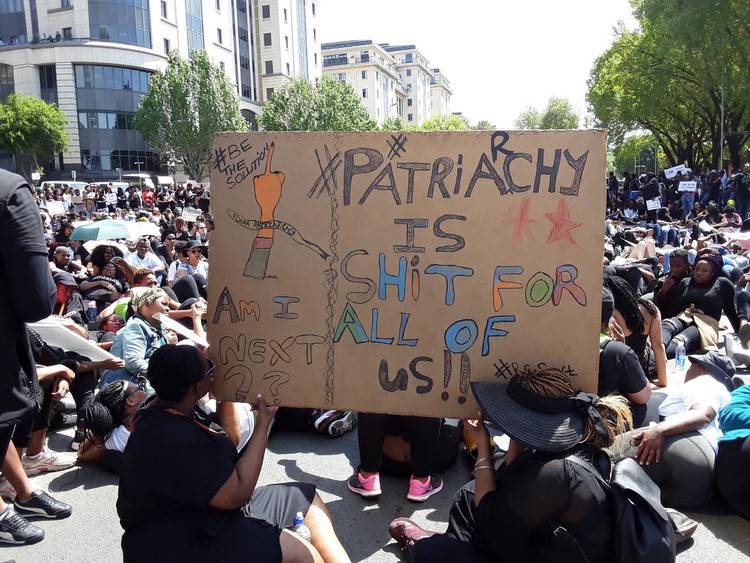Protesters call on JSE companies to fund anti-violence struggle
ANC Women’s League gets frosty response in Sandton
On Friday morning, hundreds of people dressed in black picketed outside the Johannesburg Stock Exchange (JSE) in Sandton to demand that the private sector contribute financially towards fighting violence against women.
The protesters, watched by a large number of police, started picketing outside the JSE at about 3am. By midday, the group proceeded to close the roads in Sandton to disrupt “business as usual” in the richest square mile in Africa.
People were holding placards that read: “Capitalism is killing us”, “This is not a protest, this is a revolution”, and “Women don’t owe you shit”.
The protest was one of many protests against violence against women across the country in the last two weeks. The outcry was sparked by the rape and murder of 19-year-old Uyinene Mrwetyana, a University of Cape Town student.
A statement released by the Call for Action Civil Society Coalition on 12 September said the picket was directed at the private sector because it was not an “innocent bystander” in gender-based violence. “At the centre of the violence we experience as poor women … is the exploitation of our labour, disposability of our bodies and the cheapness of lives under capitalism,” read the statement.
It demanded that all listed companies provide a 2% levy on profits to organisations fighting against gender-based violence and femicide, fund the National Strategic Plan on gender-based violence and ensure that all women in the workplace have access to internal processes for reporting sexual harassment, abuse and violence.
“Dear private sector, your silence [on gender-based violence] is uncomfortable,” said Black Womxn Caucus founder, Keitumetsi Moutloatse. She said the women at the protest were doing the job of President Cyril Ramaphosa by holding the private sector to account.
She said government had failed to address gender-based violence despite the numerous marches and memorandums that were handed over. “We have the National Strategic Plan which has very practical steps that government can take to deal with the crisis of gender-based violence but they keep telling us that there is no money. Mr President, the women of South Africa have come here today to show you where the money is,” said Moutloatse, pointing to the JSE building.
She said the private sector was equally responsible for fighting against gender-based violence because they were also citizens of the country. “[The private sector] has the money to fund the fight against gender-based violence, so [it should do so],” she said.
Nicky Newton-King, CEO of the JSE, came out to accept the memorandum. The crowd chanted “Fund the fight” as she prepared to speak. She thanked the protesters for coming to Sandton and bringing the heart of business’s attention to gender-based violence.
“It frankly is completely shameful that 25 years into our democracy, our mothers, our sisters, our girl children, our friends cannot be safe even in their own homes, their own workplaces, their places of study, their places to play and their places to be … Your memorandum makes some very important points and we, as business, will take that to … our listed companies and ask them to consider how they would want to respond to each of those points.”
Newton-King promised to respond to the memorandum within seven days.
“Khwezi! Khwezi!”
Former Minister of Social Development Bathabile Dlamini and the ANC Women’s League (ANCWL), dressed in ANC regalia, also attended the march. Dlamini supported the coalition’s call on JSE companies to fund fighting gender-based violence. She repeated the league’s call to declare a state of emergency on gender-based violence.
But when the ANCWL attempted to move through the crowd, people started chanting “Khwezi Khwezi”. This referred to the late Fezekile Ntsukela Kuzwayo, also known as Khwezi, who accused former president Jacob Zuma of raping her in 2005.
The organisers said everyone, especially women, had a right to be at the march but the march should not be hijacked by political parties. They urged everyone to respect one another and unite as women to stand against gender-based violence.
Next: Housing activists take City of Cape Town to court
Previous: Fire closes Mitchells Plain hospital
© 2019 GroundUp.
This article is licensed under a Creative Commons Attribution-NoDerivatives 4.0 International License.
You may republish this article, so long as you credit the authors and GroundUp, and do not change the text. Please include a link back to the original article.



